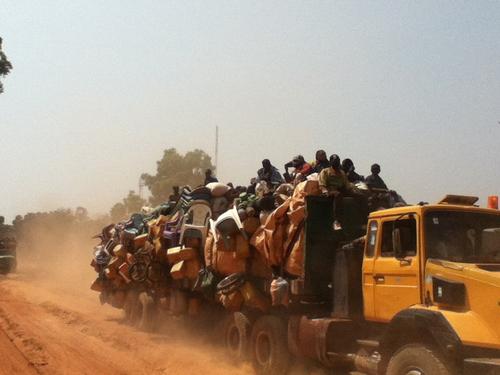Paris/Bangui – A retrospective mortality study conducted by the international medical humanitarian organization Médecins Sans Frontières (MSF) among Central African refugees in Sido, Chad, found that 2,599 people died between November 2013 and April 2104, during the violent crackdown against the Central African Republic’s (CAR) Muslim minority. The survey also revealed that among these deaths, 2,100 people were killed while still in CAR and 95 percent of the deaths were the result of gunshot, machete, grenade, or other blast wounds.
Fleeing abuse and violence Between December 2013 and January 2014, several hundred thousand people fled abuse and violence in CAR, seeking refuge in Chad and Cameroon, according to the UN High Commissioner for Refugees. Epicentre, MSF’s epidemiological research center, conducted interviews with 3,449 refugee families in Sido to understand the levels of violence during the period of November 2013 to April 2014. Nearly 8 percent (2,599 people) of the 32,768 who initially composed the 3,449 families questioned, died. Thirty-three percent of the families surveyed had lost at least one member. Twenty-eight percent had lost at least two. More than half (57%) of the families interviewed in Sido were originally from Bangui, the place of departure of most of the refugee convoys.
“The shocking levels of violence documented in our study should not leave the impression that the worst is over,” said Dr. Mego Terzian, president of MSF. “MSF teams continue to work inside enclaves in the Central African Republic where thousands of people remain trapped, protected by international forces, but with no chance to escape.”
Violence did not spare women, children or the elderly
Nearly 85 percent of those who died in CAR before any attempt to flee were men (1,863). However, the violence did not spare women, children or the elderly. Two hundred and nine children under 15 and 227 people over the age of 60 died because of violence.
The survey data and the statements gathered by MSF teams in the CAR, Chad, and Cameroon highlight the breadth of the violence that the populations experienced both in the CAR and as they fled the country. Three hundred twenty-two people died during the transfer to Chad. Seventy-eight percent of these deaths are attributable to violence.
Confined in ghettos
Today, nearly the entire Muslim population in the western half of the CAR has left in just a few months. Several enclaves under the protection of armed international forces in Bangui, Carnot, Boda, and Berberati still shelter a few thousand Muslims, although their living conditions are very precarious and they have few prospects. Now confined in ghettos, this portion of the Central African population still faces daily threats.
The Chadian government’s decision, in May, to close its border and the inadequate humanitarian aid deployed in Cameroon prevent them from seeking refuge in neighboring countries. In June, MSF teams recorded more than 1,700 new arrivals in Sido. They included people arriving from the CAR or from other transit camps in Chad, who had come to join the family members from whom they had been separated. Some had to pay to cross or walk for hours to find more “permeable” crossing points. Others came under fire.
Exhausted and traumatised
On June 13, four people were killed as they tried to cross the river, heading for Sido. On July 3, 100 people, victims of an attack on their village in the CAR, were not allowed to cross in Sido. At least five of them were wounded by gunfire during the attack, including a woman and three children. They had to walk for 24 hours before reaching Bethel, a Chadian border town, where MSF treated them and transported them to the Goré hospital, after negotiating with the authorities, who finally approved the transfer.
After several months of displacement, the Central Africans who reach Cameroon arrive exhausted and traumatized. Their health status is alarming, particularly in terms of nutrition, with nearly one of every two children suffering from malnutrition.
'Bare minimum is humanitarian assistance'
“There are still massive deficits in the distribution of aid to the hundreds of thousands who managed to escape the violence and reach Chad or Cameroon,” said Dr. Terzian. “The bare minimum that can be done for this population that has suffered incredible violence, lost family members, and been uprooted from their homes, is to provide them with humanitarian assistance.”
MSF has been working in the CAR since 1997. More than 2,300 people work with the five operational sections in medical-surgical projects located in more than 15 Central African towns. MSF also works in the Central African refugee camps in southern Chad and eastern Cameroon.



